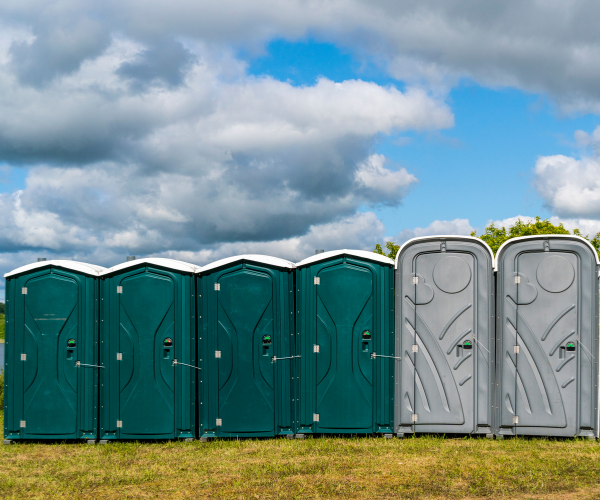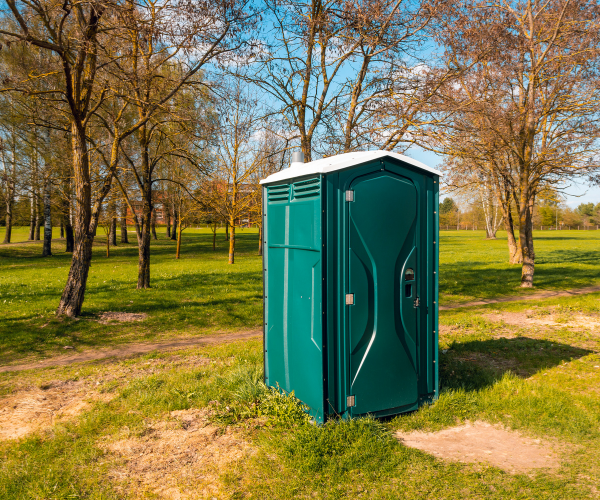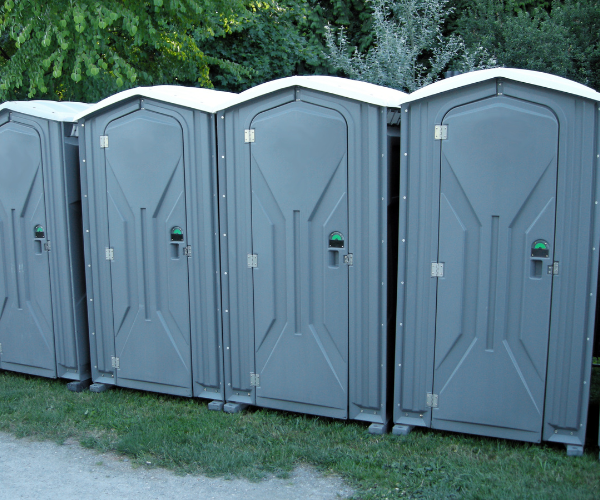Using portable toilets offers several eco-friendly advantages, making them a sustainable choice for sanitation needs. Portable toilets help conserve water significantly compared to traditional flushing systems. Each unit uses only a fraction of the water, which drastically reduces resource consumption during events. Moreover, portable toilets are designed to minimize waste impact, as their construction is aimed at reducing environmental footprints. Many modern units incorporate recyclable materials and are designed for energy-efficient production processes. The confined waste containment system in portable toilets also prevents untreated waste from entering the environment, protecting local water sources and preventing soil contamination. Furthermore, portable sanitation services typically adhere to strict waste disposal regulations that ensure waste is treated and recycled accurately, reducing potential harm to the environment. By choosing portable toilets, event organizers can effectively promote environmental responsibility while also providing guests with clean and convenient facilities. These units are transported and serviced efficiently, limiting vehicle emissions associated with multiple travel journeys. Lastly, many providers offer regular maintenance and eco-friendly cleaning solutions to maintain hygiene and environmental safety. On a broader scale, using portable toilets at large-scale events lowers the burden on public wastewater systems, preventing overload and associated contamination risks. These combined factors position portable toilets as a responsible and sustainable option for managing temporary sanitation needs in environmentally conscious ways.

Portable Toilet Rentals in Charlotte, North Carolina
Call today for a free quote (336) 980-2028
Portable Toilet
Fast, Easy, & 100% Free To Get Started
Over 30 Years Experience
With over 30 years of experience, our Charlotte-based company is deeply rooted in the community and dedicated to providing quality services. We pride ourselves on our commitment to reliability and excellence, ensuring customer satisfaction is at the forefront of everything we do.
Exceptional Quality Service
Our commitment to quality service ensures that every portable toilet delivered is clean, reliable, and ready to meet your event's needs. With prompt responses and detailed attention, we make the sanitation experience seamless for all.
Prompt and Reliable Delivery
Our quick delivery service ensures your portable toilets arrive on time, ready to serve your event's needs efficiently. Count on us for a seamless, hassle-free experience that prioritizes your convenience.
Portable Toilets for Every Occasion in Charlotte
Call for a Free Quote Today
(336) 980-2028
Discover why Charlotte locals choose us for their portable toilet needs. As a locally owned, dependable business, we proudly serve Charlotte and surrounding areas like Concord and Gastonia. Whether at a bustling construction site, a lively festival, a private party, or an elegant wedding, we deliver top-notch services tailored to your event. Our meticulously maintained units ensure the highest standards of sanitation and guest comfort. Offering both standard and luxury units, we provide the perfect solution for any temporary sanitation requirement. Trust us for a professional experience that ensures satisfaction and peace of mind.


Our standard porta john rental units are durable and reliable for any commercial build site, housing development, public works project, or remodel job.Features include dome lighting, grated floors, and an “In-Use” locking mechanism for privacy and comfort. Regularly maintained, inspected, and cleaned by FusionSite at your location.

Developed as an alternative to full ADA-compliant restrooms, the Liberty is a spacious, wheelchair-accessible unit that can also be promoted as a family-sized restroom. Includes a patented flat-floor system for easy wheelchair access and maneuverability.Handrails, paper holder, and rotary latch are designed for simple, intuitive end-user operation.

Portable hand washing stations are essential for keeping your work site sanitary and clean. Features hands-free foot pumps, liquid soap, and paper towels.Perfect for job sites without water hookups, these units can handle hundreds of washes between services.
We Proudly Serve
Standard Portable Toilets
Our Standard Portable Toilets offer durable, clean, and reliable restroom solutions across North Carolina.
High Rise Portable Toilets
Whether on skyscrapers or high-rise buildings, our High Rise Portable Toilets meet the unique needs of construction in Charlotte.
Restroom Trailers
Our Restroom Trailers blend luxury and functionality, ideal for upscale events throughout Charlotte with 'A Sani-Can'.
Roll off Dumpsters
At A Sani-Can, our Roll off Dumpsters in Charlotte provide efficient waste management solutions for any project size.
Septic Tank Cleaning
We offer expert Septic Tank Cleaning in North Carolina to maintain system health and ensure optimal performance.
Grease Trap Cleaning
Our professional Grease Trap Cleaning services in Charlotte keep systems running smoothly for businesses of all sizes.
Fencing & Barricades
Enhance security and order with our robust Fencing & Barricades services, tailored for North Carolina's diverse needs.
Residential Storage
Our secure Residential Storage services in Charlotte, North Carolina, ensure your belongings are safe and accessible.
Charlotte's Premier Sanitation Solutions
Obtaining a quote for our portable toilets has never been easier. With just a few clicks, you can access our streamlined online form available at both the top and bottom of our website pages. Simply fill in your first name, last name, phone number, and email to receive a prompt and competitive quote. Our user-friendly platform ensures that getting the information you need is both quick and convenient. Once your quote request is submitted, our dedicated customer service team will provide guidance to help tailor our offerings to your specific needs, whether you're planning a large festival in the heart of Charlotte or a cozy backyard gathering in a nearby suburb. We pride ourselves on our prompt communication, ensuring every detail is covered well before your event begins. We understand the importance of timely delivery, which is why our logistics team works efficiently to ensure your portable toilet arrives on time, every time. With our reliable delivery service, you can focus more on the success of your event and less on logistics. Choose our hassle-free service for a smooth experience. Our commitment to quality and customer satisfaction means you'll always receive top-notch products and assistance. Experience the ease of working with a recognized name in the industry and secure the sanitation solutions you need right here in Charlotte.

Embrace the local charm of Charlotte with our portable toilets as your sanitation partner. Whether you're exploring the scenic landscapes of Freedom Park or soaking in the electric atmosphere at the annual Charlotte Pride Parade, our portable toilets are the perfect match for any occasion. With their clean, reliable, and convenient features, we ensure your guests have an enhanced experience without compromising on comfort. Nestled in Charlotte, our portable toilets are designed to blend seamlessly into the vibrant fabric of the city. From local festivals that showcase community spirit to thrilling games at the Bank of America Stadium, we provide solutions that match the unique characteristics of any venue. Our units are not only an amenity but a testament to our commitment to serving Charlotte with dedication and excellence. When it comes to sanitation needs, from single-day park events to multi-day corporate gatherings, we offer local appeal and quality-driven service, ensuring top-notch support tailored to the rhythm of Charlotte life.
Why are we the best choice in Charlotte? Our commitment to delivering exceptional portable toilet services stems from a profound understanding of Charlotte's needs. With robust options for construction sites, weddings, and public events, our units combine function with reliability. We stand out because of our local expertise and personalized support, backed by years of industry experience. Each unit reflects our dedication to quality, assuring guests a comfortable and hygienic restroom experience. If you value service that goes beyond providing facilities, our team is ready to assist—with on-time delivery, maintenance, and customized offerings. Our reputation as a trustworthy partner isn't just built on claims but on proven results that speak through our clients.
Experience fast and reliable service with our portable toilets in Charlotte. Our dedicated team ensures swift delivery, whether you have a last-minute need or a scheduled request, all while maintaining high-quality standards. Focused on meeting your timelines, our logistics experts handle every detail—from order confirmation to setup—with precision and speed. We prioritize convenience, adapting smoothly to your requirements to deliver restrooms when and where you need them. Enjoy the assurance that comes from choosing a provider who respects your time. Our commitment to service excellence and reliability makes us the top choice for portable sanitation solutions.
Explore Our Portable Toilet Offerings in Charlotte
Renting a portable toilet in Charlotte is a straightforward process designed to meet your convenience. Start by visiting our website, where you'll find easy-access forms at the top and bottom of various pages. By clicking the 'Get A Quote' buttons, you can initiate your request in just moments. To complete your inquiry, simply fill out the necessary details including your first and last name, phone number, and email address. Our user-friendly forms ensure that acquiring a precision quote aligns perfectly with your event's requirements. After submitting your information, our experienced team will promptly review your request, offering expert guidance to tailor the ideal portable toilet solutions for you. Whether you're planning an outdoor wedding, a local concert, or managing a construction project, our options cover the full spectrum of need. We prioritize clear communication, and you will receive a comprehensive estimate via your preferred contact method, enabling you to plan without hassle. Our Charlotte-based service is crafted to streamline your logistics and provide top-tier customer support throughout the process. Created with your needs in mind, our rental system is designed for speed, efficiency, and satisfaction, making your experience exceptional from start to finish. As soon as you receive our competitive quote, you'll understand why so many in the Charlotte area choose us for their portable sanitation needs, ensuring a seamless and beneficial rental experience.
The typical delivery timeframe for ordering a portable toilet depends on several factors including the size of the order, event location, and specific requirements. Generally, we strive to provide a delivery window that aligns with your schedule, ensuring that units arrive well before they're needed. For standard orders placed well in advance, delivery can usually be scheduled within a few days, especially for events in the Charlotte area. However, in peak seasons or for larger events, additional notice might be necessary to guarantee precise timing. We understand the importance of punctuality and therefore offer expedited services for last-minute requests. Our efficient logistics network is equipped to handle these situations without compromising on quality or reliability. Once you place an order, our team communicates constantly to reconfirm delivery details, providing a transparent schedule that reflects real-time availability and aligns with your event's needs. You will also receive status updates and confirmations as the delivery date approaches. In the rare case of unexpected delays, our customer service team will immediately reach out to discuss alternatives, ensuring minimal disruption and maintaining high service standards. Relying on our trusted service means you can plan confidently with expectations met and operations running smoothly. With our commitment to flexible and responsive logistics, satisfaction and punctuality are always guaranteed.
Our extensive range of portable sanitation solutions caters to any event or construction project. Whether you're organizing festivals, sports events, elegant weddings, corporate meetings, or family reunions, our services are tailored to suit every occasion. We offer luxury restroom trailers, standard porta potties, and roll-off dumpsters, each chosen to complement your event's tone and scale. For construction sites and infrastructure work, our porta potties, ADA-compliant units, and portable sinks meet all operational needs. Our offerings also include barricades and fencing to ensure order and safety, along with holding tanks and portable hand sanitization stations that emphasize cleanliness and compliance. Focused on flexibility and quality, we adapt our services to fit your specifications, ensuring seamless integration and functionality. Our experienced team supports planning and logistics, providing dependable guidance and execution to enhance your event's success. With an extensive product list, versatile setup capabilities, and timely deliveries, we are prepared to meet your precise requirements. Renowned for our commitment to excellence, we deliver modern and pristine facilities that boost satisfaction and comfort in any context. Whether hosting intimate gatherings or managing large-scale constructions, we pledge effective service that reflects the high standards our clients expect.

